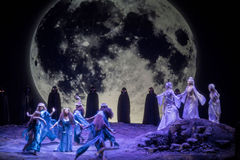| Opera Reviews | 25 April 2024 |
An enchanted eveningby Arlene Judith Klotzko |
|
| Respighi: La campana sommersa New York City Opera 5 April 2017 |
|
|
Its choice of partner is utterly inspired: the Teatro Lirico di Cagliari, in Sardinia, is a venerable and innovative company that offers year round performances of opera, ballet, symphonies and chamber music. Recent seasons at the Teatro have featured two vocal works by Respighi - this production of La campana sommersa and, another opera, La bella dormente. The libretto by Claudio Guastalla is based on a play by Gerhart Hauptmann, Die Versunkene Glocke. Acts one and three of the opera are set in the domain of graceful fairies, mischievous fauns and a very imposing baritone lizard. Act two takes place in the human realm, at the home of Enrico, who has been charged with making a big and very loud bell for the church. This intrusion into peace and quiet gets the goat of the half goat faun, who sees to it that the bell ends up at the bottom of a lake. Enrico, injured, arouses the pity of the lovely fairy, Rautendelein, After Enrico is carried back to his home by human associates his fairy admirer follows him there. Soon, he is enticed away from his wife and children and comes to live with Rautendelein. However, after his wife’s suicide and the appearance of the ghostlike shadows of his children, the guilt-ridden Enrico leaves Rautendelein. As an old man, he returns to the land of the fairies to find her now married to the lizard. He dies in her arms after one last kiss from his immortal beloved. Respighi is, of course, known for his tone poems rather than his operas. In Pines of Rome and Fountains of Rome, he creates an aural evocation of specific places -- what they look like but also, more generally, the mood and atmosphere around them. In La campana sommersa, Respighi, via the imaginative use of his augmented orchestra conjures up all manner of the natural and the supernatural. He studied with Rimsky-Korsakov and the influence shows in his descriptive music and his orchestral palette. The overall effect is a very impressionistic feeling of being enveloped by sound and sensation. The orchestra, made up of members of the New York City Opera and the Teatro Lirico di Cagliari, is brilliantly conducted by Ira Levin, who teases out the ravishing instrumental textures, particularly the details provided by varying instrumental colors. He and they produce a tapestry of sound – and a very Italianate sound indeed. The singers are uniformly excellent. Brandie Sutton as Rautendelein, sings with an iridescent tone, extraordinary flexibility, and great charm and stage presence. Michael Chioldi as her friend and later her husband, the lizard, has a big and beautifully colored baritone voice. Marc Heller, as Enrico the bell maker, has a fine, powerful tenor with ringing top notes and loads of stamina, Indeed, at times, he sounds as if he could dash up the street to the Met and sing Siegfried. Glenn Seven Allen, as the faun, clambers around dexterously and mischievously, and sings delightfully. The versatile Kristin Sampson is Enrico’s wife; she has a lovely, full bodied soprano voice and is also a convincing actress. Both her character and her music have a certain verismo quality. It would be good to see her in Puccini roles (and rumor has it that we soon will). Renata Lamanda, as Rautendelein’s granny, has a mellow mezzo voice and a very imposing presence. Philip Cokorinos, as the curmudgeonly curate, sings with a fine and very deep rolling bass voice. New York City Opera’s next production will be mounted at the Harlem Stage. It’s an 18th century Spanish chamber opera, Los Elementos. I look forward to seeing it.
|
|
| Text ©
Arlene Judith Klotzko Photos © Sarah Shatz |

 New York City Opera is back, resuming its dual mission to give new life to neglected musical treasures and to nurture talented young singers. This production of Respighi’s La campana sommersa is its most impressive effort since it was reconstituted two seasons ago. Once again, the somewhat peripatetic company is mounting a production at the lovely Rose Theater, located on the fifth floor of the Time Warner Center at Columbus Circle. On this occasion, employing a strategy familiar to the Metropolitan Opera, its neighbor up the road at Lincoln Center, City Opera is presenting a co-production.
New York City Opera is back, resuming its dual mission to give new life to neglected musical treasures and to nurture talented young singers. This production of Respighi’s La campana sommersa is its most impressive effort since it was reconstituted two seasons ago. Once again, the somewhat peripatetic company is mounting a production at the lovely Rose Theater, located on the fifth floor of the Time Warner Center at Columbus Circle. On this occasion, employing a strategy familiar to the Metropolitan Opera, its neighbor up the road at Lincoln Center, City Opera is presenting a co-production. 





